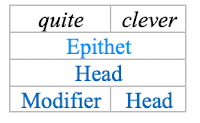Fawcett (2010: 206):
The quality group has as its pivotal element (the apex) an adjective or an adverb (typically a manner adverb). The quality group corresponds to the semantic unit of 'quality'. However we should note that the 'quality' may be a quality of either a 'thing' (e.g., clever) or a 'situation' (e.g., cleverly in He cleverly opened it with a paper clip). Thus quality groups that refer to the quality of an object have an adjective as their apex, and quality groups that refer to an event have, typically, a manner adverb at their apex — but sometimes other classes of adverb, such as the 'usuality' adverb often.¹¹
Blogger Comments:
[1] To be clear, here Fawcett applies a functional label to a formal unit, a group, thereby creating a theoretical inconsistency with regard to other groups in his own model, not least because he labels this group 'from above' (function) despite classifying it 'from below' (structure). In SFL Theory, formal units are assigned functions in the structure of the unit above them in the rank scale. For example,
- the word clever is assigned the function Epithet in the nominal group a clever device,
- the nominal group (very) clever is assigned the function Attribute in the clause he's not (very) clever, and
- the adverbial group (very) cleverly is assigned the function Manner: quality in the clause He (very) cleverly opened it with a paper clip.
[2] To be clear, in SFL Theory, qualities can be realised as circumstances (Manner), participants (Attribute) or a feature of a Process, as in he sped around the corner, where sped means 'moved speedily'. Halliday & Matthiessen (1999: 208):
[3] To be clear, in Fawcett's model, 'situation' is the semantic unit — regardless of metafunction — realised in syntax by a clause. Its nearest equivalent in SFL Theory is the ideational unit 'figure' (Halliday & Matthiessen 1999).
[4] To be clear, in SFL Theory, this variant of Fawcett's quality group is a nominal group with Epithet as Head, as in (she's) quite clever:
[5] To be clear, in SFL Theory, this variant of Fawcett's quality group is an adverbial group, as in (he does not plan) very cleverly:
[6] To be clear, in Fawcett's model (Figure 12), 'event' is not language, but a 'belief system' unit, that is typically realised in language as a 'situation' in semantics, and as a clause in syntax. As previously explained, this is inconsistent with the the epistemological assumptions on which SFL Theory is founded.
[7] To be clear, the 'usuality' adverb often does not realise a quality — not least because 'usuality' is interpersonal in function, whereas 'quality' is ideational. This highlights the general inconsistency here: many groups with an adverb as its apex do not construe qualities; for example (from Halliday & Matthiessen 2014: 313, 191):
- adverbs of place: abroad, overseas, home, upstairs, downstairs, inside, outside; out, up, down, behind; left, right, straight; there, here
- adverbs of time: today, yesterday, tomorrow; now, then
- adverbs serving as comment Adjuncts: naturally, inevitably, obviously, clearly, plainly, doubtless, indubitably, unsurprisingly, predictably, surprisingly, unexpectedly, evidently, allegedly, supposedly, arguably, presumably, luckily, fortunately, hopefully, sadly, unfortunately, amusingly, funnily, importantly, significantly, wisely, cleverly, foolishly, stupidly, rightly, correctly, justifiably, wrongly, unjustifiably, characteristically, typically, truly, honestly, seriously, admittedly, certainly, actually, really, generally, broadly, roughly, ordinarily, frankly, candidly, honestly, confidentially, personally, strictly, tentatively



No comments:
Post a Comment